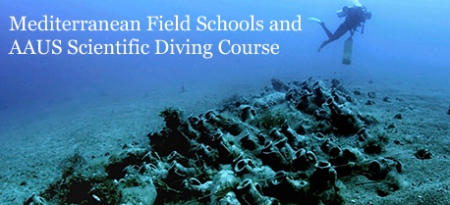The 2015 Field School in Maritime Archaeology is an ongoing research expedition conducted in Bermuda by faculty of the University of Rhode Island. Participants come from the University of Rhode Island and from other colleges and universities throughout the United States and Canada. The field school is a research-based learning experience that exposes students to a variety of activities including archival research, artifact conservation, archaeological survey, and underwater excavation and documentation of historic shipwrecks.
The field school will be conducted in the three-week period from July 20 to August 8, 2015. Students will receive 3-6 undergraduate or graduate credits in history. The field school meets many of the fieldwork requirements for anthropology and archaeology majors at universities in the United States and beyond. Professors Rod Mather and James M. Allan of the University of Rhode Island History Department are the program directors. Dr. Allan and Dr. Mather have extensive experience in underwater archaeological field methods, remote sensing, archival research, and scientific diving.
Course enrollment is limited. There are no academic prerequisites, but all participants in the field school must be scuba divers certified to at least the Open Water level, and all must be at least Scientific Divers-in- Training as specified in the American Academy of Underwater Sciences’ (AAUS) Diving Safety Manual. Contact Dr. Mather or Dr. Allan to discuss how the latter training may be obtained prior to the start of the field school. Students must have their own diving equipment (tanks and weights will be provided).
While in Bermuda, students will participate in each of three research modules: laboratory training in the museum’s conservation facility, archaeological survey and documentation of historic shipwrecks, and archival research in the Bermuda National Archives, located in the nearby city of Hamilton. Students selecting the 3- credit option will be required to keep a field journal containing details of each day’s research activities, instruction, and procedures. Journals will be submitted for evaluation at the end of the field school. Students will also be required to prepare and submit a scaled plan of the shipwreck site that we will be documenting, and will participate in preparing a collaborative report on the field school that will be submitted for publication in MariTimes, the magazine of the National Museum of Bermuda. Students selecting a 6-credit option will be required to complete all activities for the 3-credit option plus a research paper using materials presented in the course reader, supplementary readings available in the National Museum of Bermuda’s library, or from primary documents available in the Bermuda National Archives. In addition, while in Bermuda students will attend periodic evening lectures on such topics as ship construction, archaeological theory and methodology, archival research methods, archaeological survey methods (magnetometer and visual survey), site excavation and mapping, analysis of archaeological data, and the conservation of waterlogged artifacts.
The course fee is $3,500, all-inclusive, except airfare. Full course credit. For additional information contact Dr. Mather (RodMather@uri.edu) (401-874-4093) or Dr. Allan (jallan@stmarys-ca.edu) (925-253-9070). Application form and additional information are available on the field school website at http://www.uri.edu/international/bermuda.
For information on the research diving requirements contact URI’s Diving Safety Officer Anya Hanson <anyahanson@uri.edu.




 The Illyrian Coastal Exploration Program would like to invite individuals interested in Mediterranean archaeology to apply for the 2013 underwater sciences field school. Set along the beautiful Dalmatian coast from July 8-21, the course spends one week each in Croatia and Montenegro. The field school is hosted by the International Centre for Underwater Archaeology in Zadar in collaboration with RPM Nautical Foundation and Transylvania University.
The Illyrian Coastal Exploration Program would like to invite individuals interested in Mediterranean archaeology to apply for the 2013 underwater sciences field school. Set along the beautiful Dalmatian coast from July 8-21, the course spends one week each in Croatia and Montenegro. The field school is hosted by the International Centre for Underwater Archaeology in Zadar in collaboration with RPM Nautical Foundation and Transylvania University.





